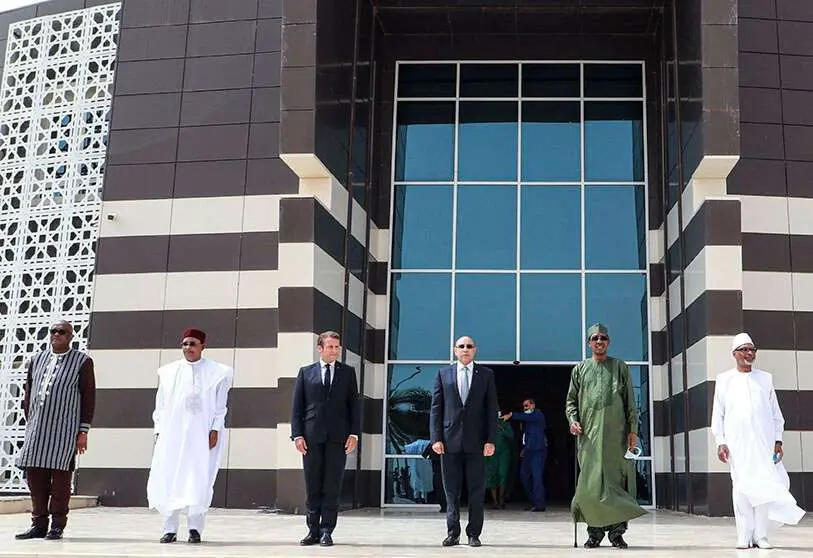Mali, the military directive and West Africa

When I arrived in Mali in 2017, the then French President, François Hollande, was making his third visit to the country. France had entered Mali to drive out the jihadists and Barkhane's forces had already been fighting in the north of the country for four years.
At that time, Bamako continued to be the peaceful city we know despite the reinforcement of security in some of its neighbourhoods and hotels. Next to the city, which bubbled with activity day and night, the Niger River remained peaceful and continued to feed the population, most of whom were living in great poverty.
The years that followed were marked by killings all over the place, affecting the most vulnerable populations in the north.
Since coming to power, President Macron has continued the policy of his predecessor. If France protects its interests in Africa and especially its uranium mines operated by the Orano group in Niger or other West African settlements such as Total in Mauritania, its presence in Mali is rather linked to the security imperative. The country remains a nerve centre next to Burkina Faso where jihadist groups find refuge and proliferate in the face of weak states and ill-equipped armies.
Coup de théâtre not to say coup d'état, on August 18, we learn that a military junta took hostage President Ibrahim Boubacar Keïta announcing a new era. "Our country Mali sinks from day to day in chaos, anarchy and insecurity through the fault of the men in charge of its destiny," accused the coup officers in an official statement. They also said that "The UN mission Minusma, Barkhane, the G5 Sahel, the Takuba force remain our partners," thus reassuring European partners and international opinion. It is therefore in the wake of the security policy of the "outgoing" president that the junta is part of, which has however begun talks with the Movement of 5 June-Rally of Patriotic Forces (M5-RFP) which had opposed for months to the deposed president and called for his departure. However, no concrete decision came out of these negotiations, including the long-awaited decision to return power to civilians. A mediation mission of the Community of West African States (ECOWAS) ended Monday without agreement on the conditions for a transition.
If there is one country that is more affected than others by what is happening in Mali it is Algeria. At the announcement of the putsch, the tone of Algiers wanted to be firm and the northern neighbour rejected any "unconstitutional" change of government. But the junta does not intend to go backwards and Algeria quickly understood that it has to deal with it.
Tebboune sent his foreign minister, Sabri Boukadoum, who said Mali is an "extremely important" country for Algeria. "I came on the instructions of the President of the Republic, Mr. Abdelmadjid Tebboune, to listen first, discuss and exchange views on the situation in Mali so that the Malian people can live in peace, serenity and harmony," he said in an official statement.
Indeed, Algeria shares 1.400 km of borders with neighbouring Mali. The Malian anthill is a real headache for Algiers, which rightly fears a rise of jihadism in the region.
In Algeria everyone still remembers the sad events of 2012, a collateral effect of the coup d'état of the time when President Amadou Toumani Touré was overthrown in a rather troubled political context. At that point in the country's history, there were on the one hand the Tuareg and their Azawad Liberation Movement who were demanding independence, and on the other hand the already weak army was unable to cope with the jihadist groups and their spread in the region.
It was in this context that the Movement for Unity and Jihad in West Africa (Mujao) attacked the Algerian Consulate in Gao and executed one of its members. The Consul had also lost his life. Several years later the survivors of this sad affair were released after negotiations with the Algerian secret service.
Other sad events will follow. In 2013, following the French intervention in Mali, 16 jihadists had taken Westerners hostage at the Tiguentourine gas site in Algeria. This was one of the most terrible hostage-takings in the country and resulted in the death of the 37 hostages. The spokesman for the attackers said at the time that this operation was "in reaction to the blatant interference of Algeria authorizing the use of its airspace by the French air force to conduct raids in northern Mali.
It is therefore burdened by this record of coups d'état and ill-prepared armies that Algeria is now trying to negotiate peace in Mali. With a porous Libyan border from which armed groups escape and gravitate, the country is more than ever threatened.
Will the junta have the means to maintain peace in Mali? What will its strategy be? For the moment nobody knows. But what is certain is that the instability of the country does not bode well for West Africa or Europe.

